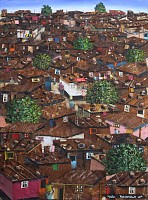BIOGRAPHY

VUSIMUZI KHUMALO
(b. 1951 Balfour North, Gauteng, South Africa)
Vusi Khumalo completed his basic education in Germiston, thereafter spending 10 years working in various companies in South Africa. In 1986, while working in Germiston, Khumalo left South Africa because of the political climate, especially as a long-standing member of the African National Congress. Khumalo departed with his family for ANC camps located in Zambia and Tanzania. It was in Dakawa Camp, Tanzania, where he first had the opportunity to explore fully his life-long hobby, art. Having completed his 0-level General Certificate of Education through correspondence with the University of London, Khumalo began to be trained in and, later, to teach textile printing, art and design. This culminated in a summer course in art in the Gerlesberg Art School, Sweden, in 1991. In 1992, Khumalo was repatriated, and the Dakawa Art and Craft Community Centre was re-established in Makhanda, Eastern Cape. He continued to teach there and his efforts won him a one-year scholarship to the Konstfack National Art College, Stockholm.
After having returned from exile in 1992, Vusi Khumalo became fascinated with the burgeoning shanty towns that mushroomed around the urban centres of South Africa. With the scrapping of the Urban Areas Act, “influx controls” and forced removals, many of the previously-disenfranchised rushed to the cities to seek work and stake their claim on land bordering the cities. Open fields and abandoned land quickly transformed into what are now called informal settlements.
Khumalo set about reconstructing these explosions of humanity, using the very materials that the shanty town was built of – corrugated iron, earth, wood, plastic – pioneering a way of seeing that has since been mimicked by many street artists plying their trade at markets and traffic lights.
What set Khumalo apart then and now is the extraordinary sense of perspective that he brings to his works, as well as an authentic technical genius that recreate these scenes in a hyper-real way, like a diorama, “recording tomorrow’s history today,” as he likes to say. Interestingly and naively, we all thought at the time that these expanding informal settlements would rapidly give way to formal housing arrangements as the Reconstruction and Development programme ostensibly swung in to gear. Decades on they appear very much here to stay, not as launch pads to formal housing, but for many as permanent homes. Indeed Khumalo tracks this “formalising the informal” and, while many of his earlier works depicted utterly treeless, muddy wastelands with our fellow citizens going about their daily lives against all odds, now the trees and the notorious bucket system toilets are peppered throughout the urban “village”, and Khumalo notices that churches and community centres have emerged.
In this sense, Khumalo continues to record history and assert the humanity at the heart of these organic cityscapes, populated by ordinary people going about the everyday, and testifying to the irrepressible human spirit that conjures community out of chaos.
Vusi Khumalo is a visual historian - an artist who depicts the lives of communities still deprived of the pot of gold at the end of the rainbow nation. He provides an unflinching document of urban dispossession through collages constructed from the flotsam of everyday life - discarded tins, rusted metal, fragments of clothing and wood. From these corroded materials he evokes sprawling vistas of shanties stretching across the landscape like misshapen patchwork quilts.
At once, his works communicate a sense of immediacy, history and prophecy. They are uncomfortable reminders of a legacy of dispossession. In the context of the country's current, escalating housing problems they encapsulate the magnitude of the crisis as eloquently and succinctly as the photojournalist's lens. And they warn of the potential consequences for a country whose great expectations have been short-changed by unemployment, poverty and homelessness.
Khumalo belongs to an acclaimed pantheon of South African cultural activists who were forced into exile during apartheid. Artistic predecessors such as Gerard Sekoto and Dumile Feni died impoverished and alone, receiving only posthumous acknowledgement. Fortunately Khumalo was able to return home where his work has received considerable acclaim. But success has not blind-sighted him to the reality of life for many South Africans, for whom dreams of a better life departed long ago.
Alongside artists such as Willie Bester and Zwelethu Mthetwa, he uses South Africa's sprawling townships and informal settlements as reference points. But while their starting blocks might be similar, Khumalo's working methods and conceptual processes are entirely different. His rural and urban shantytowns are masterfully executed in terms of their seemingly endless perspective. They appear to stretch way beyond the picture plane, evoking the sense of cramped clutter that characterises these settlements in reality. One can almost imagine the sounds and smells emanating from the nooks and crannies of the makeshift homes. Khumalo's use of materials almost replicates the actual arduous process of constructing these informal abodes. He painstakingly cuts and nails a myriad of discarded fragments of different shapes and sizes to a board. Each work becomes a gritty, hard-edged vignette of life on the urban periphery.
Khumalo has resisted slipping into the well-worn formula of prettifying poverty. Resorting neither to sentiment nor didacticism, he imbues his narratives with a documentary, no-frills resonance. The figures populating these informal-scapes are neither idealised nor individualised. But one has the sense of their resilience in the face of hardship. A washing line here, a garden there serve as reminders that life goes on for communities still stranded outside the rainbow.
Hazel Friedman
SELECTED EXHIBITIONS
2023
Natural Habitat, group show, 16 on Lerotholi, Langa, Cape Town, South Africa
2022
Uhambo Iwami, solo, Everard Read, Cape Town, South Africa
2021
Oasis, 25th anniversary group show, Everard Read, Cape Town, South Africa
2020
Us, Everard Read group online exhibition, South Africa
Imago, group show, Everard Read, Franschhoek, South Africa
2019
Winter, group show, Everard Read, Cape Town, South Africa
2018
20 Years On, solo, Everard Read, Cape Town, South Africa
2017
Southern Abstraction, group show, Everard Read, London UK
2016
Opening exhibition, Everard Read, London, UK
Nocturne, group show, Everard Read, Cape Town, South Africa
2015
Empire, group show, Everard Read, Cape Town, South Africa
2014
People & Places, group show, Imibala Gallery in association with Everard Read, South Africa
Postcards from Mzansi, solo, Everard Read Cape Town, South Africa
2013
Possessed, group show, Everard Read, Cape Town, South Africa
Centenary, group show, Everard Read, Cape Town, South Africa
2011
Small Works, group show, Everard Read, Cape Town, South Africa
2010
View from the South, group show, Everard Read, Cape Town, South Africa
Khumalo, Mzimba, Dyaloyi, three man exhibition, Everard Read, Cape Town, South Africa
2009
The City, group show, Everard Read, Cape Town, South Africa
2008
The Wave, Chinese cultural exchange, Everard Read, Cape Town, South Africa
2007
Solo exhibition, Portland Gallery, London, UK
Exhibition at the Hubei Institute, Wuhan, China, as the second leg of a cultural exchange
2006
Cultural Exchange, a group show exploring China with 4 Professors from the Hubei Institute of fine art after a visit to Wuhan, China, Everard Read, Cape Town, South Africa
Abstraction, solo, Everard Read, Johannesburg, South Africa
2005
Solo, Everard Read, Cape Town, South Africa
2004
Solo, Portland Gallery, London, UK
2003
Solo, Everard Read, Johannesburg, South Africa
2000
Solo October at the Portland Gallery, London, UK
1998
Solo, Everard Read, Cape Town, South Africa
1996
Two World, two person exhibition with Roxandra Dardagan, Skotnes Gallery, Albany Museum, Grahamstown Art Festival, South Africa
Me and Myself, solo exhibition, Wezandla Art Gallery, Port Elizabeth, South Africa
1995
Manscape, solo exhibition, Wezandla Gallery, Port Elizabeth, South Africa
1994
Solo exhibition, Konstfack National Art College, Stockholm, Sweden
1989-91
Part of a touring group show in Sweden and Norway
1988-91
Saba Saba National Exhibition in Dar Es Salaam, Tanzania
SELECTED CORPORATE COLLECTIONS
Cazenove & Co, Johannesburg
Coca Cola South Africa
Calajero
Capital Alliance Holdings
Daimler Chrysler (S.A.)
Didata, Johannesburg
E.F.T Corporation
F.B.C. Fidelity Bank
Fisher Hoffman And Sithole
Johannesburg Consolidated Investments Ltd
Mckinsey & Co (Usa)
Merrill Lynch
Mvelaphanda Holdings
Old Mutual Plc (London)
Privest, Johannesburg
Sanlam
Standard Bank Investment Corporation Ltd
Telkom
Task UK Ltd



